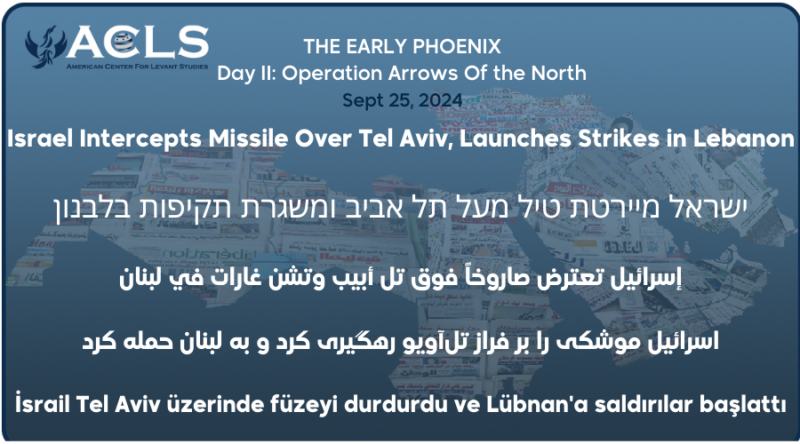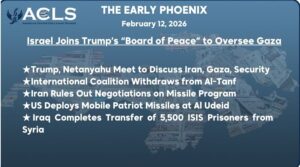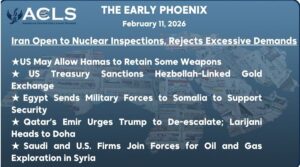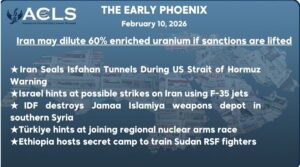
September 25, 2024
Day II: Operation Arrows of The North
-
Israel Intercepted Hezbollah Ballistic Missile Over Tel Aviv
Israeli airstrikes targeted southern Lebanon early Wednesday, while a Kader 1 missile aimed at Israel’s Glilot military base was intercepted over Tel Aviv. This marked the first time in this conflict that a missile from Lebanon reached Tel Aviv. Prime Minister Netanyahu postponed his trip to New York, calling for security consultations.
-
Israeli Air Force Launches New Wave of Strikes in Lebanon
Israeli airstrikes targeted multiple towns in southern Lebanon, including Al-Hosh, Naqoura, and Al-Qlayleh, following the Israeli military’s announcement of a new offensive. Sirens were heard across northern Israel, including areas near the Golan Heights, Zikhron Yaakov, and Haifa, signaling potential drone infiltration and rocket attacks. Approximately 10 rockets were intercepted in Haifa and the Krayot area, with no reported damage or injuries. The Israeli military also intercepted a drone originating from Syria near the southern shores of Lake Tiberias.
-
Hezbollah and Hamas Launch 300 Rockets Targeting Northern Israel
Hezbollah and Hamas launched over 300 rockets into northern and central Israel in the past 24 hours. Hezbollah took responsibility for 16 of these attacks, targeting regions like the Golan Heights, Galilee, Haifa, and Jezreel Valley. These areas are home to around 1.5 million people.
-
IDF Eliminates Newly Appointed Missile Commander
Israeli forces killed Hezbollah’s top missile commander, Ibrahim Qubaisi, appointed only one day before, in response to the group firing over 300 rockets into Israel. The raid, carried out by F-35 aircraft, also resulted in six deaths and 15 injuries. The strike targeted Hezbollah’s missile division, responsible for precision-guided rocket attacks on Israel. Hezbollah retaliated with over 250 missile strikes, hitting Israeli targets, including military bases and settlements across the Galilee and Haifa areas.
-
Israeli Strike Targets Warehouse Near Beirut as Tensions Escalate
Israeli forces launched an airstrike near Beirut, hitting a warehouse in the Saadiyat area, approximately 20 kilometers south of the city. Lebanese security sources confirmed the attack, which occurred overnight.
-
Israel Concerned Over Presence of 40,000 Fighters Near Golan Heights
Israeli officials are closely monitoring the arrival of approximately 40,000 fighters from Iraq, Yemen, and Syria near the Golan Heights, according to a report from Haaretz. These fighters are reportedly waiting for a call from Hezbollah’s Secretary-General Hassan Nasrallah to join the fight against Israel. While Israeli security acknowledges that these fighters may lack professional military training, their numbers still pose a significant threat.
-
Hezbollah Arrests Alleged Spy Responsible for Leaking Sensitive Information to Israel
Hezbollah’s security apparatus has reportedly captured a “senior agent” accused of leaking critical information to the Israeli military, which allegedly led to recent assassinations of Hezbollah leaders. According to a source cited by Hezbollah’s media, the agent was arrested after being fed false information about Hezbollah commander Ali Karaki, used as bait to apprehend him. The source dismissed rumors of the agent fleeing to Israel, confirming that he is currently in Hezbollah’s custody. The capture marks a significant development in Hezbollah’s internal security operations, as they continue efforts to thwart Israeli intelligence activities.
-
Israel Targets Syria Coast With Airstrikes on Tartus And Jableh
Israeli airstrikes hit Syria’s coastal cities of Tartus and Jableh, as Syrian air defenses attempted to intercept the missiles. Social media videos captured the explosions, while pro-regime media reported the downing of three drones. One drone’s wreckage caused material damage in Tartus’ Asqbouli village but no injuries were reported. Official statements from the Syrian regime and Israeli military are pending.
-
Israeli Envoy Rejects UN Criticism, Defends Actions Against Hezbollah and Hamas
Israel’s ambassador to the United Nations, Danny Danon, strongly condemned the widespread criticism of Israel at the UN General Assembly. Danon dismissed remarks from leaders such as Turkish President Erdogan and Jordanian King Abdullah, who denounced Israel’s actions in Gaza. He called Erdogan’s comparison of Prime Minister Netanyahu to Adolf Hitler “outrageous” and urged Israel to stand firm. Danon criticized the UN for its silence on Israeli hostages and called for pressure on Hezbollah to avoid further conflict in Lebanon. He emphasized that those attacking Israel diplomatically cannot expect to play a role in any potential peace solutions.
-
Biden Urges Ceasefire and Palestinian State in Final UNGA Address
In his final address to the United Nations General Assembly, U.S. President Joe Biden urged world leaders to confront the horrors of the October 7 attacks by Hamas and support a ceasefire-for-hostages deal. Biden emphasized Israel’s right to defend itself while also addressing the humanitarian crisis in Gaza. He advocated for a two-state solution, calling for a future where both Israelis and Palestinians live with security and dignity. Biden’s speech, focused on global crises, highlighted his belief that progress towards peace in the Middle East is key to confronting broader threats, including Iran’s nuclear ambitions.
IRAN
-
US Intel Warns Trump of Specific Iranian Threats to Assassinate Him
Donald Trump’s presidential campaign revealed that U.S. intelligence briefed him on credible threats from Iran aiming to assassinate him. The threats, reportedly “real and specific,” are seen as an attempt by Iran to destabilize the United States. Trump received the warning from the Office of the Director of National Intelligence. Iran has previously denied similar allegations regarding assassination plots targeting the former U.S. president. The details of the specific threat remain undisclosed, but this briefing comes as tensions between the U.S. and Iran persist.
-
Iran Denies Supplying Russia with Ballistic Missiles, Promotes Peace Talks
President Pezeshkian, during a meeting with European Council President Charles Michel, refuted claims that Iran supplied Russia with ballistic missiles. He emphasized Iran’s focus on resolving the Ukraine conflict through peaceful dialogue. Addressing concerns about Iran’s nuclear program, Pezeshkian reiterated that Iran is committed to negotiations and opposes nuclear weapons development. The European Union also expressed its readiness for continued cooperation on various regional and global issues. Michel highlighted the EU’s expectations for Iran’s constructive role in Palestine, the Ukraine conflict, and nuclear discussions.
-
Iran Mediates Talks for Russian Yakhont Supersonic Missiles to Arm Yemen’s Houthis
Iran is mediating secret discussions between Russia and Yemen’s Houthi rebels to supply advanced anti-ship missiles, raising alarms across the region. Western and regional sources confirmed the talks involve Russia potentially transferring Yakhont supersonic missiles, which could threaten maritime traffic in the Red Sea. The Houthis have already disrupted shipping lanes, sinking vessels and launching missile strikes as part of their support for Gaza. U.S. and Saudi officials expressed concern, warning that such a missile transfer would destabilize the region further. The Yakhont missile, known for its precision and speed, would significantly boost the Houthis’ military capabilities against U.S. and European ships.
-
Iranian President Calls for Global Action on Israel, Signals Openness to Nuclear Deal
Iranian President Pezeshkian, addressing the United Nations General Assembly, called for urgent international intervention to stop Israel’s military actions in Gaza and Lebanon. He condemned Israel’s actions as “state terrorism” and war crimes, accusing it of genocide. Pezeshkian warned that the violence threatens regional stability and held the U.S. and its allies accountable for failing to prevent what he termed a “horrific catastrophe.” He asserted that Israel has already been defeated in Gaza, and further aggression will not restore its power. Despite the tensions, Pezeshkian expressed Iran’s willingness to re-engage in nuclear talks under the Joint Comprehensive Plan of Action (JCPOA) if international commitments are met. He emphasized Iran’s role in shaping a new global order and voiced hopes for peace in Ukraine. However, fresh sanctions on Iran over alleged missile transfers to Russia have heightened tensions. Pezeshkian also condemned recent Israeli attacks in Lebanon.
-
Sweden Accuses Iran of Orchestrating 2023 Cyberattack Over Quran Burnings
Swedish prosecutors charged Iran’s intelligence agency with hacking an SMS operator, sending 15,000 revenge messages after a Quran-burning incident. The attack, allegedly in retaliation for the 2023 burnings, encouraged violence against Sweden. Sweden condemned the Quran burnings but defended its citizens’ right to freedom of expression. Although relations with Islamic countries soured, Sweden and Denmark are considering banning insults to religious texts. Iran’s Supreme Leader, Ali Khamenei, called for harsh punishment of the perpetrators, while protests erupted across Islamic nations, condemning the desecration of their holy book.
-
Macron Urges Iran to Help Deescalate Tensions in Lebanon
French President Emmanuel Macron urged Iranian President Masoud Pezeshkian to leverage Iran’s influence to ease tensions in Lebanon. During their meeting at the United Nations General Assembly, Macron emphasized Iran’s responsibility in promoting deescalation, specifically referencing the destabilizing actions of Hezbollah. Macron’s request comes as conflict in Lebanon continues to escalate, with concerns over regional instability. The French president called for Iran to support efforts aimed at reducing violence and preventing further escalation in the region.
SYRIA
-
Hezbollah and Regime Forces Intensify Attacks On Idlib, Causing Civilian Casualties
Regime forces and Hezbollah escalated attacks on towns in Idlib and Aleppo’s countryside, leading to significant civilian casualties. The bombardments targeted Sarmin, Taftanaz, and Kafriya, resulting in the deaths of five civilians and injuries to twelve others. The recent shelling has forced many residents to flee their homes, increasing displacement in the region. Iranian-backed militias have also employed suicide drones to strike residential and agricultural areas, causing further destruction and civilian suffering in northern Syria.
-
Assad Regime Aims to Raise $50 Million Through New Vehicle Plate Auctions
The Assad regime plans to generate $50 million in revenue by auctioning distinctive vehicle plate numbers, according to Damascus Transport Director Ali Muhammad Deeb. This initiative is part of a broader effort to replace vehicle plates across Syria, starting next month. The regime’s Ministry of Transport introduced 16 new plate models, with prices set at 250,000 Syrian liras for a pair of plates. Deeb emphasized that the three-year project is designed to modernize the appearance of vehicles and support the public treasury. The program will begin in Damascus and its surrounding areas, with a phased rollout across the country.
-
Syrian Activists Celebrate Hezbollah Commander’s Death in Israeli Airstrike
Syrian opposition activists celebrated the death of Hezbollah commander Hussein Ali Ghandour in an Israeli airstrike. Known as “The Butcher of Madaya,” Ghandour was notorious for his role in the siege of Madaya, where Hezbollah and the Syrian regime reportedly starved civilians between 2015 and 2017. Syrian activists expressed joy over his death, describing it as divine justice for his brutal actions, including burying wounded Syrians alive. Despite calls for solidarity with Hezbollah, opposition members rejected the notion, citing Ghandour’s crimes against Syrians as reason to celebrate his demise.
IRAQ
-
Iraqi Shiite Militias Strike Israel’s Arava Region
A UAV launched by pro-Iranian militias in Iraq was detected approaching Israel’s Arava region early Wednesday morning, triggering sirens. The Israeli Defense Forces confirmed the drone crossed into Israeli airspace from the east and fell in the area, with no injuries reported. The militias claimed the target was near the Jordan Valley. This comes days after Israeli fighter jets intercepted another UAV fired from Iraq toward the southern Golan Heights. The IDF continues to respond to escalating drone activity from Iranian-backed militias, with recent incidents threatening key areas in northern and southern Israel.
-
Iraqi Armed Factions Plan Military Response to Israeli Aggression
The leaders of several Iraqi armed factions including the Popular Mobilization Forces agreed to support Hezbollah with military aid and manpower against Israeli aggression. They also threatened U.S. bases in Iraq and Syria. Coordination with Hezbollah is ongoing. In recent hours, the “Islamic Resistance in Iraq” group has escalated its attacks, launching 10 advanced “Al-Arqab” missiles and deploying 18 booby-trapped drones, some from Iraqi territory. Security expert Ali al-Moussawi warned that Israeli strikes on Iraq could widen the conflict and ignite further regional escalation.
GULF NATIONS
-
Trump’s Qatar Praise Highlights Middle East Policy Concerns
Former President Trump hosted the Emir of Qatar at Mar-a-Lago, praising Qatar’s role in promoting peace, despite its controversial ties. Critics argue this embrace could alienate traditional U.S. allies like Saudi Arabia and the UAE, pushing them towards China and Russia. Qatar has been accused of supporting Islamist movements and terrorist organizations, while benefiting from hosting the U.S. CENTCOM base. Some believe relocating the base could strengthen American alliances and pressure Qatar to shift its policies. However, it remains unlikely any U.S. administration will challenge Qatar’s role in the region.
-
Intersec Saudi Arabia to Focus on AI, VR in Predictive Security Solutions
Intersec Saudi Arabia, the Kingdom’s premier exhibition for security and safety sectors, will spotlight the role of artificial intelligence (AI) and virtual reality (VR) in personalized security solutions. Running from October 1-3, 2024, at the Riyadh International Convention and Exhibition Center, the event will feature insights from Kearney, its exclusive knowledge partner. AI is expected to drive predictive security in smart cities, while VR will help prepare for real-world scenarios. The exhibition will also discuss security measures for major global events and the latest threats from emerging technologies.
TURKIYE
-
Erdogan Calls Netanyahu a New Hitler, Urges Global Action
Turkish President Recep Tayyip Erdogan compared Israeli Prime Minister Benjamin Netanyahu to Nazi dictator Adolf Hitler, calling for global unity to stop him. Speaking at the United Nations General Assembly, Erdogan condemned Israel’s actions in Gaza, likening them to genocide. He said Gaza has become the “world’s largest cemetery for children and women,” with over 41,000 Palestinians killed since October 7. Erdogan urged the international community to create mechanisms to protect Palestinians, criticizing countries that support Israel’s policies. He demanded an immediate ceasefire and accused Israel of ethnic cleansing. Erdogan also reiterated his call for an independent Palestinian state based on 1967 borders, with East Jerusalem as its capital.
===========
Related Issues:
Turkiye Pushes for Islamic Bloc with Egypt and Assad Against Israel
Iran Sends Ballistics To Russia, Plots to Kill Jews in Europe, and Meddles in U.S. Elections



